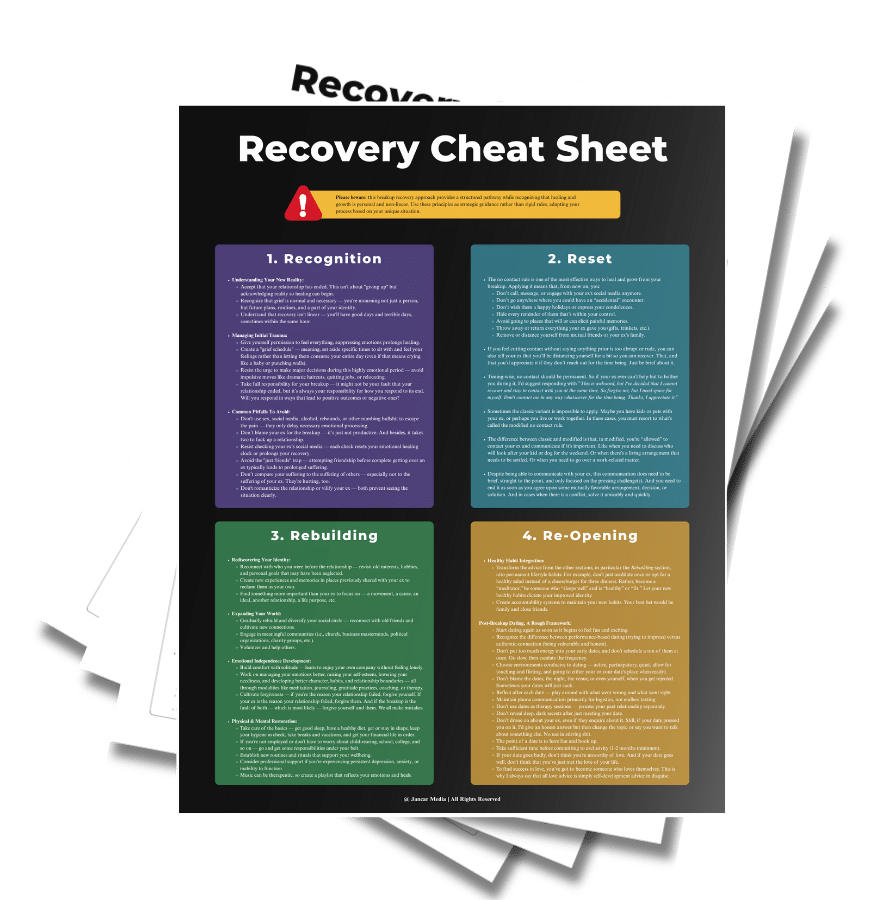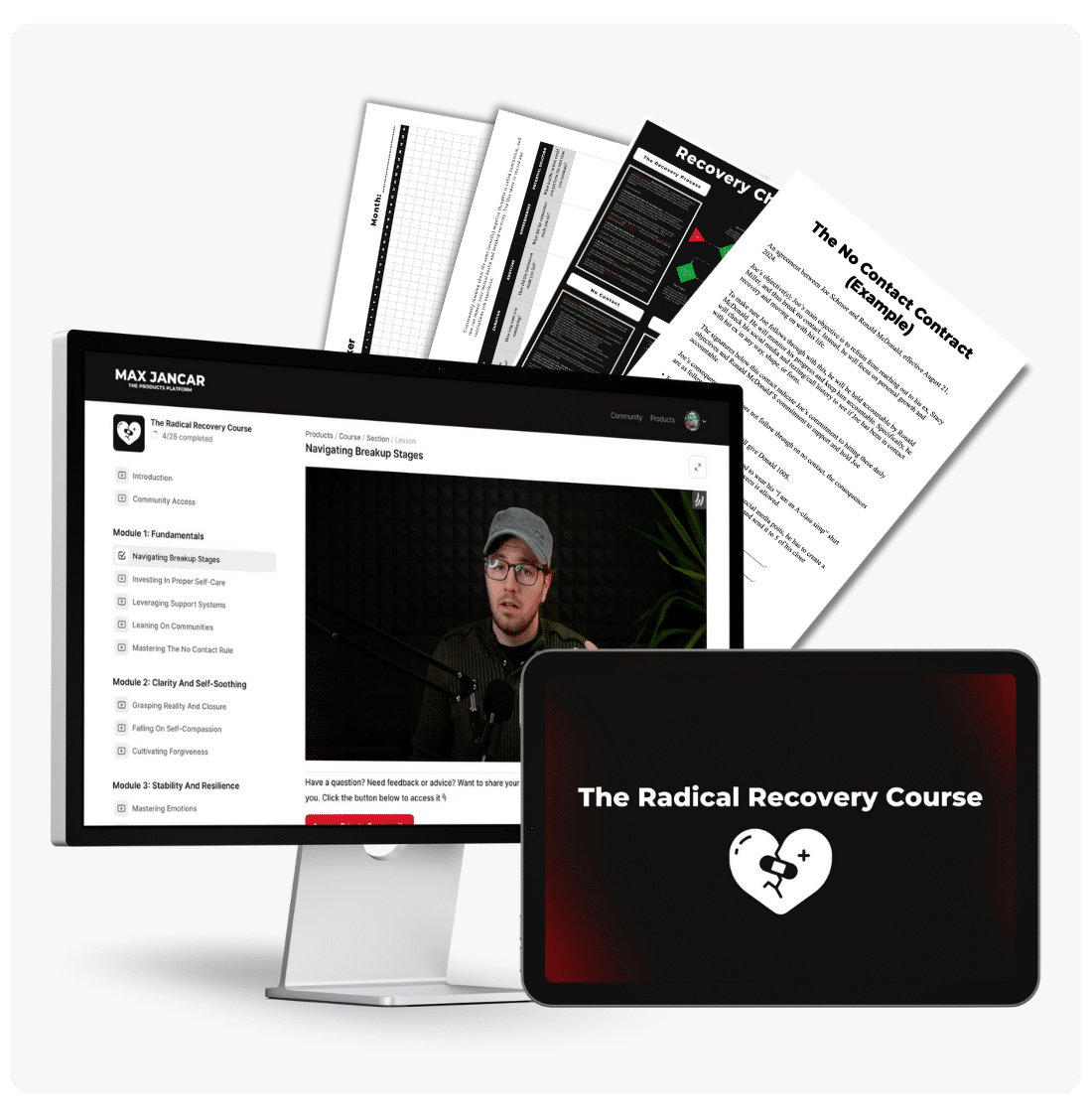Click play to listen to this article.
Years ago, when I was still a dating coach, I had a client who struggled with insomnia because of an airstrike of intrusive thoughts about his ex. He couldn’t sleep regardless of the remedy he took.
We couldn’t continue with our coaching if he kept falling asleep at almost every bar I took him to practice approaching women. So my number one priority was to get this guy’s ex out of his head so he could sleep better after his recent breakup.
After weeks of coaching, while reviewing his results on one of our sessions, he told me about a recent dream. He dreamt of calling his ex in the middle of the night, professing his love, and begging her to come back, only to later realize that the person on the line was her new boyfriend telling him he was going to snap his neck.
I chuckled when he told me this story. Thank god that didn’t happen, I thought.
Well. Turns out it did happen. My client assured me of it a few days after telling me the story. He was so sleep-deprived that he overlooked the fact that the entire sequence of events was real.
In retrospect, I get how many people can’t sleep after a breakup. That’s one of the reasons I dedicated a lot of time and effort to researching the domain of how to sleep better. Below are some of the coolest and most useful discoveries I learned about till now.
A guide to breakup recovery based on embracing discomfort, extracting wisdom from dark moments, and healing through evidence-based practices.
Order Your CopyWhy You Can’t Sleep After A Breakup
If there’s one factor that influences your ability or inability to sleep, it’s stress. In fact, studies show that stress is one of the leading causes of insomnia worldwide. When we feel stress, our body is in emotional or physical tension, often referred to as hyperarousal. (1)
After a breakup, stress tends to stem from three sources: forced lifestyle changes, fear of the uncertain future, and an occasional (or in some cases frequent) longing for reconciliation.
And stress itself comes in two flavors:
Acute stress: an intermittent form of stress. Sometimes it’s there; other times, it subsides or goes away completely. Most of us feel it, and most overcome it.
Chronic stress: a form of stress that lasts for a more extended period. The danger of this stress form is that you can become so accustomed to it that you become unaware you even have it. Even worse, if you don’t find a way to manage it, it may lead to severe health problems like depression, obesity, anxiety, diabetes, and heart disease. (2)
Chances are, you’re suffering from one or both types of stress at the moment, and that’s what’s causing you sleep problems. Thankfully the solutions below might help.
This cheat sheet lays out 40+ solutions to overcoming a breakup so you can create a new opportunity for love — be that with your ex or someone completely different.
Get The Free Cheat SheetSolutions For When You Can’t Sleep After A Breakup
The following is not an exhaustive list. There are countless other solutions for better sleep out there: energy tapping, essential oils, chiropractic care, Bowens therapy, proper sleep hygiene, and so on.
If those things work for you, great. They didn’t work for me or the majority of my readers. I also think they’re, for the most part, total bullshit. Therefore I’ll only report on sleep solutions that I know bring results for most people.
1. Exercise Before Bed
It’s been proven numerous times that exercising before bed improves one’s overall sleep quality. In fact, exercising before bed does more than just improve sleep. It lifts your mood, makes you more productive and less anxious, and, over a span of months and years, even enhances your entire quality of life. (3) (4) (5)
The best part is that your evening exercises don’t need to be anything fancy. Jogging, long walks in the woods, lifting light weights, and aerobic exercises will all help when you can’t sleep after a breakup.
If you’re someone who is already regularly active, don’t shy away from amping up the frequency or the difficulty of your exercises. In fact, I encourage you to do it. People way smarter than me proved that the more rigorous your evening exercise, the better quality sleep you’ll get.
2. Do 4-7-8 Breathing
While there are many different breathing techniques, the one that works best when you can’t sleep after a breakup is the 4-7-8 technique. While it is true that it was developed to lessen anxiety, it works just as well for lessening wake time in the middle of the night.
Here’s how to do it:
- Sit down somewhere comfy. Keep your back straight, letting the air flow naturally.
- Inhale through your mouth for 4 seconds. Make sure you gently place your tongue at the top of your mouth, right in front of your teeth, while you do this. Also, keep your belly in check. It should be your belly that expands, not your chest.
- Hold your breath for 7 seconds.
- Exhale through your mouth for 8 seconds. Make sure you pucker your lips while you do this. And as with inhaling, it’s your belly that should be contracting here, not the chest.
Repeat the exercise 3 to 10 times a couple of minutes before you go to bed.
3. Practice Meditation
Meditation is the practice of observing oneself in silence. You can do it practically anywhere, at any time, and you don’t need any fancy gear or software to pull it off.
While there are many ways you can start, I prefer the no-bullshit zen way. Sit down, back straight, eyes closed, focus on the breath. Inhale at your normal pace through the nose, and exhale through the mouth. Remember your name before you were born.
When a thought comes to disrupt your stillness, don’t judge or cling to it. Just let it be there and gently bring your focus back to your breath. It’s that simple.
Above all, however, don’t be hard on yourself. Meditation is difficult. You probably won’t last two breaths the first time before a thought interrupts your process. That’s okay. Let it go and try again.
If you’re new to meditation, I recommend checking out a blogger named Jeff Warren. I love the guy. He seems very relatable and down-to-earth. I found him through doing one of the meditation courses on Calm.com (I am NOT an affiliate — I just like the product).
4. Leverage Qi-Gong
Qi-gong is another gem to try out when you can’t sleep after a breakup. It’s an ancient Chinese system of physical exercises and breathing control. Think of it as meditation, but with movement.
Here’s a video of how to do it. Just be warned, it’s a bit spiritual. If you’re into that shit, more power to you. Me personally? It turned me off.
As you’d expect, I won’t go into the spiritual background of qi-gong, mainly because I don’t buy into it. But I will explain the science behind the practice. Surprisingly, there’s a lot of it.
I’ve found studies ranging from 1964 to recent years, all reporting qi-gong’s numerous physical, mental, and emotional health benefits. The most commonly mentioned are lowered stress, lower blood pressure, lower anxiety, and of course, better sleep.
However, despite the ginormous piles of studies on the positive effects of qi-gong, note that most of them were done with small test groups. Therefore, they are probably somewhat inaccurate.
If you’d like to do the research yourself, start with the Qigong Institute. And if you’d like to learn how to actually perform qi-gong, YouTube’s your friend. But I also recommend picking up a book titled The Way of Qigong by Ken Cohen.
5. Experiment With Sleep Music
Sleep music is a genre of songs with a slow tempo and a relaxing vibe. They’re often filled with ambient noise, static, binaural beats, and sounds of nature.
Inversely to the other solution for when you can’t sleep after a breakup covered till now, sleep music is the least proven. So take its effectiveness with a grain of salt.
Then again, it works well for most of my readers. In fact, I still use sleep music to ease myself into a good night’s rest after a difficult day in business. I don’t remember a time when I didn’t feel more relaxed after listening to it.
My recommendation: try falling asleep with sleep music in the background for about two to three weeks, then analyze whether it helps or not.
If you’re feeling experimental, you can also throw sleep stories into the mix. These are essentially your average narrations but with a soothing theme, voices, and sounds. You can find a lot of great ones on Calm.com if you have a few bucks to spare, although YouTube will also suffice.
6. Change Your Diet For The Better
Another way many people deal with the inability to sleep after a breakup is by cutting out or greatly limiting high-fat, high-sugar, fried, and processed foods. So goodies like milk chocolate, bread, pasta, fast food, and the like.
The effects of this lifestyle change go beyond breakups. Cutting out or limiting unhealthy food is proven to help you build a more stable emotional foundation.
This means that you won’t have extreme slumps into sadness or anger nor extreme jumps into euphoria. You’ll be a more balanced person. (6)
What a lot of people also do when they change their diet is add supplements. I personally take vitamins E, C, and B and some fish oil every morning. Maybe experiment with supplements yourself, too.
Since talking of pills, let’s talk sleep medication. If you have trouble falling asleep after a breakup or are beginning to see signs of insomnia, it may be a good idea to take them. According to a study comprised of 2000+ individuals, it supposedly does help. (7)
7. Implement Proven Sleep Hacks
Here are some useful hacks to incorporate into your routine that should improve your sleep, rapid-fire style:
- Sleep in a quiet, dark, and cold bedroom (65–70 degrees Fahrenheit / 18-21 degrees Celsius).
- Get 7 to 9 hours of sleep per night.
- Go to sleep and wake up at roughly the same time every day.
- Avoid screens at least 1 to 2 hours before bedtime.
- Limit daytime naps to less than 90 minutes or avoid them altogether.
- Take some magnesium supplements before bed.
- Avoid synthetic sheets, blankets, and pillow covers. Opt-in for linen or full-cotton ones. And when it comes to pillows specifically, grab goose-down feather ones.
- Buy blackout curtains. They do exactly what you would think: block most of the sunlight that could make its way into your bedroom and disrupt your sleep.
- Buy a white noise machine — essentially a little box that puts out static noise that is proven to aid sleep.
The Dangers Of Trying To Sleep Better After A Breakup
Attempting to improve your sleep can have a counter-effect, especially if you start obsessing about sleep improvement.
What you’ll find is that if you start to force yourself to fall asleep or to simply sleep better, you might worry and overwhelm yourself so much that you ultimately prevent yourself from falling asleep and sleeping better.
Therefore, take a slow, understanding, and patient approach to sleep improvement. Try to have fun with it. Try to make it enjoyable. Gamify it somehow. Get a friend to keep you accountable or to help out somehow.
And for God’s sake, don’t try to implement all the solutions from this article, all at once. Otherwise, you’ll overwhelm yourself, lose motivation, and only harm your sleep quality.
Pick one or two solutions for now. Forget the rest. When you’ve practiced them a bit and perhaps got some decent results with them, consider adding a new solution to the mix. That, or replace one of the old ones with a new one.
When I couldn’t sleep after my breakups, for example, all I did to remedy the issue was begin exercising in the evenings. That’s it. Only after weeks of exercising have I also started supplementing, meditating, and using a white noise machine. Funnily enough, I never needed the rest of the solutions. And that’s perfectly fine too.
You don’t need to stick with every sleep solution I covered. Sometimes you don’t need any. Sometimes all you need is time away from the breakup.
This cheat sheet lays out 40+ solutions to overcoming a breakup so you can create a new opportunity for love — be that with your ex or someone completely different.
Get The Free Cheat SheetRelated Reading
- How To Rebuild (Or Build) Self-Esteem After A Breakup February 26, 2020
- How To Grow From Your Breakup Pain (7 Science-Backed Ways) April 20, 2022
- On Taking Responsibility For Your Breakup December 12, 2021
- Sit The Fuck Down And Be Grateful February 25, 2022
- 10 Tips For Making Better Post-Breakup Decisions March 9, 2023
- Never Suffer Alone September 7, 2023



